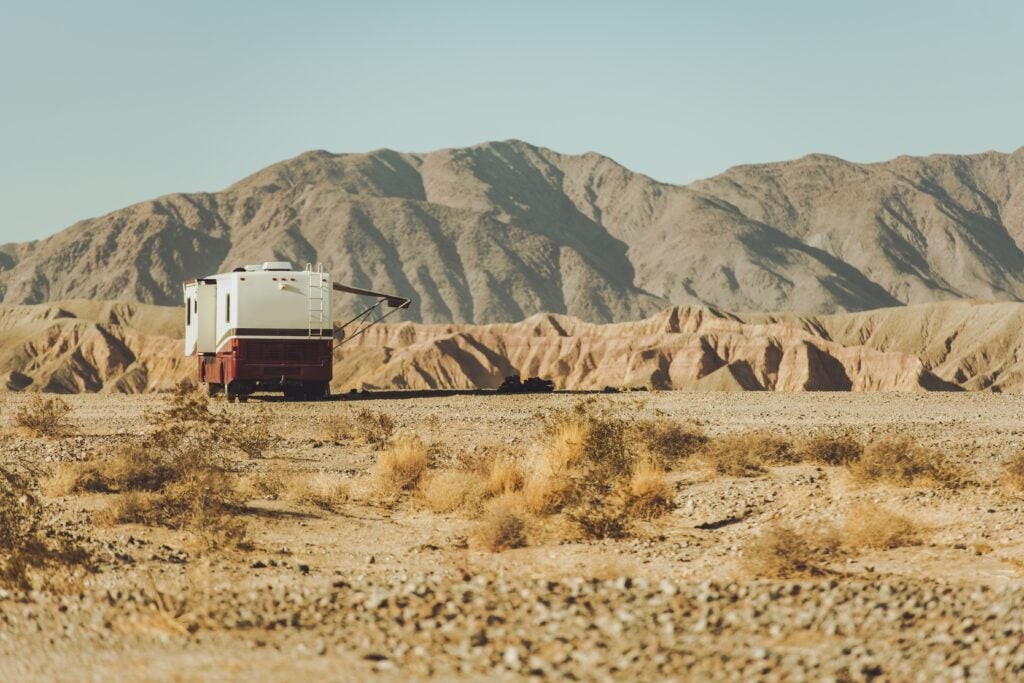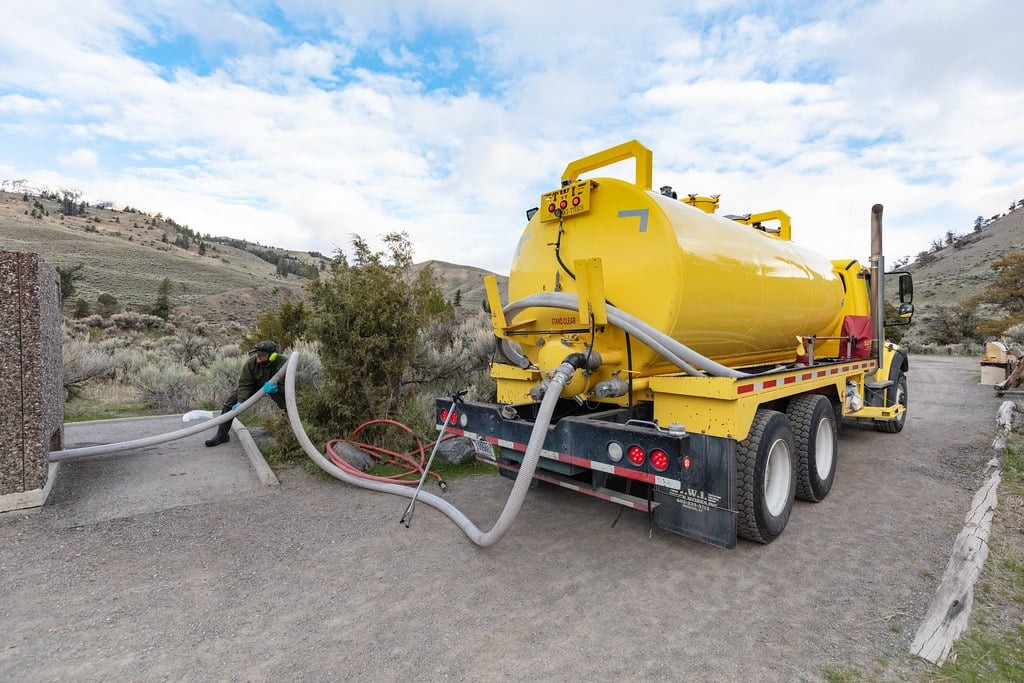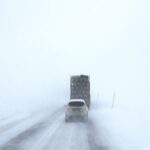Are you looking for free travel trailer parking and affordable RV camping options? TRAVELS.EDU.VN explores numerous locations where you can enjoy no-cost RV stays, offering tips and tricks to help you save money and experience the freedom of the open road. Discover how to find the best free RV camping spots, plan your trip effectively, and enjoy the perks of traveling without the high costs of traditional campgrounds with our budget-friendly travel advice.
1. Understanding Free RV Camping Basics
What are the key terms and considerations for free RV parking? Securing permission to park is paramount. Here’s a breakdown of essential concepts:
- Boondocking/Dry Camping: Parking your RV without any hookups for water, sewer, or electricity. This is quintessential free RV camping.
- Black Water Tank: The tank that holds wastewater from your RV’s toilet. Managing this is crucial for extended free stays.
- Blue Boy: A portable container to transfer black water for dumping at a proper station.
- Bureau of Land Management (BLM) Land: Vast areas, especially in the western US, where you can camp for free, typically for up to 14 days. According to the Bureau of Land Management, dispersed camping is allowed on most BLM land, but it’s crucial to check local restrictions.
- Honey Wagon: A service that pumps out black and gray water tanks for a fee.
- Dump Station: A facility to empty black and gray water tanks.
- WallyDock: Informally parking overnight at a Walmart.
 Travel trailer boondocking in the desert offering free RV camping with stunning desert landscapes
Travel trailer boondocking in the desert offering free RV camping with stunning desert landscapes
2. Finding Free RV Parking Locations
Where can you find locations that offer free travel trailer parking? Many retail outlets and businesses across the U.S. offer free RV parking, with a few caveats.
- Retail Outlets: Walmart, Cracker Barrel, Bass Pro Shops, and Cabela’s often allow RVers to park overnight. Always confirm with the store manager and adhere to any specific rules. According to Walmart’s corporate policy, overnight RV parking is permitted unless prohibited by local ordinance, which varies by location.
- Lowes and Home Depot: These are additional possibilities for overnight stays.
- Casinos: Many casinos provide designated RV parking areas. Check with the management for specific guidelines and rules. Some casinos even offer amenities like dump stations for a small fee.
- Truck Stops: Can be an option, but use only designated RV spots.
- Rest Stops: Generally, overnight parking is not allowed, but short rest stops are usually acceptable. Avoid extending awnings, setting up chairs, or pitching tents.
Remember, courtesy is key. Always clean up your parking spot and be respectful of the property.
3. Exploring Other Affordable RV Camping Options
What alternatives exist for cheap travel trailer parking if free options are limited? State and National Parks typically charge fees, but they offer amenities and scenic locations.
- State and National Parks: Although not free, these parks can be relatively inexpensive and offer basic amenities. These have limited hook-ups, but you can enjoy a spot far from crowds and might even have bathrooms or pit toilets which will save you from having to leave and dump your black tanks. Reservations are often required, especially during peak season. The National Park Service reports that campground fees vary widely, but generally range from $15 to $35 per night.
- Harvest Hosts: By paying an annual membership fee (around $100-$150), you can park for free at wineries, breweries, farms, golf courses, and other unique locations.
- Boondockers Welcome: Similar to Harvest Hosts, this platform, now owned by Harvest Hosts, allows you to stay on private properties for free with a yearly fee.
TRAVELS.EDU.VN recommends using RV LIFE Trip Wizard to plan your route and find these locations. This tool helps locate campgrounds and points of interest tailored to your travel preferences.
4. The Allure of Free Camping: Why Choose Boondocking?
Why is free camping so appealing to RV enthusiasts? Boondocking allows you to immerse yourself in nature and enjoy serene, open spaces.
- Isolation and Scenery: Boondocking provides a quieter atmosphere and stunning dark skies.
- Cost Savings: The most obvious benefit is the elimination of campground fees.
- Flexibility: Boondocking allows you to travel on your own terms without being tied to traditional campgrounds.
However, remember to plan for essentials like groceries, as you may be far from stores. Safety is also a consideration when camping in remote areas.
5. Understanding BLM Land Camping
What are the specifics of camping on Bureau of Land Management (BLM) land? BLM land offers unique opportunities for dispersed camping, but it’s important to follow the rules.
- Location: States like Colorado, Utah, and Wyoming are prime locations for BLM camping.
- Time Limits: Stays are usually limited to 14 days within a 30-day period.
- Distance: Camp at least 100-200 feet away from any road, trail, or water source.
- Waste Management: Always pack out your trash.
According to the BLM, these regulations are in place to protect natural resources and ensure a sustainable camping experience for all visitors.
6. Essential Equipment for Free RV Camping
What equipment do you need to camp comfortably for free? While boondocking, you will need to be self-sufficient.
- Power Source: Essential. Options include extra batteries, generators, and solar power.
- Water and Sewer: Use onboard tanks. Conserve water by taking shorter showers, using sponge baths, and capturing dishwater. Ensure tanks are empty before you start.
- Communication: A cell phone booster can improve your signal in remote areas.
According to a study by the RV Industry Association, the majority of RVers who boondock invest in solar panels to maintain a sustainable power supply while off-grid.
7. Managing Water and Sewer During Free Stays
How do you handle waste and water without hookups? Careful management is essential for longer free camping trips.
- Water Conservation: Implement strategies to minimize water use.
- Waste Disposal: Never dump gray or black water into the soil. Use dump stations or portable containers.
- Composting Toilet: Consider a composting toilet to extend the life of your black water tank.
 Honey wagon providing black water removal service showing modern wastewater management
Honey wagon providing black water removal service showing modern wastewater management
8. The Convenience and Freedom of Boondocking
What are the overall benefits of free RV camping? Boondocking provides a unique sense of freedom and self-sufficiency.
- Independence: Enjoy the ability to travel and camp on your terms.
- Cost Savings: Significant reduction in travel expenses.
- Unique Experiences: Access to remote and scenic locations.
With careful planning and the right equipment, free RV camping can be a rewarding and economical way to explore the country.
9. Planning Your Route with TRAVELS.EDU.VN
How can TRAVELS.EDU.VN help you plan your free RV camping trip? TRAVELS.EDU.VN offers tools and resources to make planning your next RV getaway easier than ever.
- RV LIFE Trip Wizard: An online planning tool to create RV-safe routes and locate campgrounds and points of interest.
- RV LIFE App: A companion app to access trip information on the go.
Let TRAVELS.EDU.VN help you create unforgettable memories with carefully crafted itineraries and access to hidden gems. Discover the best of Napa Valley with our exclusive tours and services.
10. Frequently Asked Questions (FAQ) About Free RV Camping
Have questions about free RV camping? Here are some answers to commonly asked questions:
- Is it legal to park my RV overnight at Walmart? Many Walmarts allow overnight RV parking, but it’s essential to confirm with the store manager as policies can vary by location and local ordinances.
- How long can I stay on BLM land for free? Stays are typically limited to 14 days within a 30-day period.
- What is boondocking? Boondocking refers to RV camping without any hookups for water, sewer, or electricity.
- Do I need a special permit to camp on BLM land? Generally, no permit is required for dispersed camping on BLM land, but always check local regulations.
- What is a “Blue Boy”? A portable container to transfer black water for dumping at a proper station.
- Can I dump my RV waste tanks on BLM land? No, it is illegal and environmentally harmful to dump RV waste tanks anywhere other than designated dump stations.
- What are Harvest Hosts? Harvest Hosts is a membership program that allows RVers to stay overnight at wineries, breweries, farms, and other unique locations for free.
- How can I conserve water while boondocking? Take shorter showers, use sponge baths, capture dishwater, and consider installing a low-flow showerhead.
- Is it safe to boondock alone? While boondocking alone can be safe, it’s important to take precautions such as informing someone of your location, carrying a communication device, and being aware of your surroundings.
- What should I do with my trash while boondocking? Always pack out all your trash and dispose of it properly at designated waste disposal sites.
Ready to experience the unparalleled beauty and luxury of Napa Valley? Contact TRAVELS.EDU.VN today for exclusive tour packages tailored to your preferences. Let us handle the details while you savor every moment. Call us at +1 (707) 257-5400, visit our website at TRAVELS.EDU.VN, or stop by our office at 123 Main St, Napa, CA 94559, United States. Experience the best of Napa Valley with travels.edu.vn – where your journey begins.
